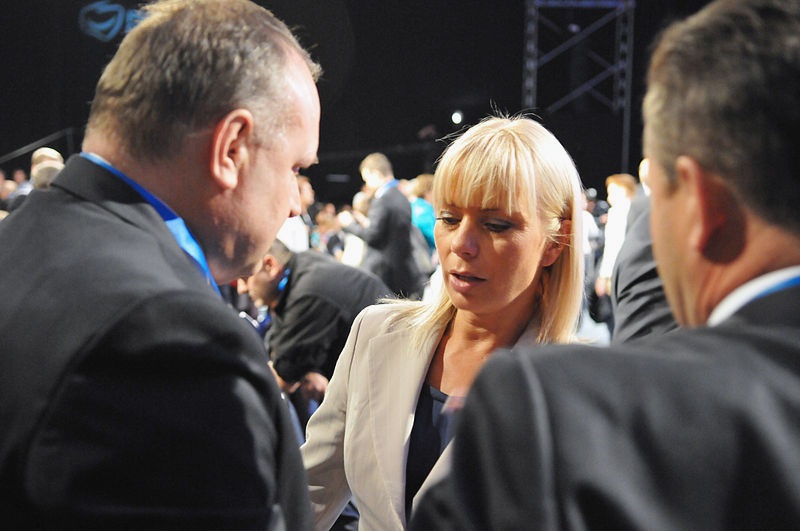
From the beginning of November, the new European Commission under Jean-Claude Juncker started its reign. This breath of fresh air in Brussels administration is a chance for the internal market to become again a priority in the European agenda, which is nowadays more focused on European funds, subsidizing indebted South-European countries or introducing unnecessary detailed regulations.
To the post of internal market commissioner, president Jean-Claude Juncker decided to nominate Elżbieta Bieńkowska, the Polish former deputy prime minister and minister of regional development and transport. The Polish politician has been offered one of the most crucial functions in the Commission, even more important than her predecessors – Janusz Lewandowski (financial programming and budget commissionner, 2009-2014) and Danuta Hübner (regional development commissioner, 2004-2009).
The internal market, a concept aimed at facilitating economic exchange across the European Union, has originally been at the very core of the European integration. However, in recent years the EU focused more on subsidy programmes or climatic affairs. The internal market still remains an untapped potential: according to the European Commission’s report from 2012, eliminating barriers connected mainly with cross-border services and launching the digital single market should create 2.8 million job positions – much more than EU social initiatives, such as “Youth Guarantee” or green jobs programme.
But when will we see these millions of jobs, it depends on Commissioner Bieńkowska. What should she do in order to improve the economic situation of Europe?
Firstly, the new Commission should propose harmonization of national regulations concerning marketing of products. Now the necessity of complying with different regulations in each EU state increases the production costs which is harmful for the European economy and what discourages entrepreneurs from expanding the scope of their activities beyond their homeland. For example, according to the statistical data, now only 6 % of Polish companies operate internationally. The new Internal Market Commissioner Bieńkowska should review European Commission’s legislative plans in order to cancel proposals that would potentially cause more bureaucracy and obstacles despite being labelled as “right” and “facilitating” the internal market development. The Common European Sales Law, or this year’s EC proposal of changes in VAT system for trans-European enterprises, are good examples of plans that can do more harm than good.
Secondly, Commissioner Bieńkowska should focus on developing the single digital market. Nowadays distributors of music, films or e-books should fulfill different criteria which depend on each EU country. Harmonization of these criteria will encourage digital media platforms to run their activities in all EU countries. Currently, it often happens that a user from Germany can buy a song in some digital shop, but another user from Poland simpliy cannot do it. The Commission should realize its commitment – published in 2012 – to reform the European regulations concerning “cross-border portability of content”. Moreover, similar improvements should encompass the access to scientific articles and films that are a part of the European cultural heritage – which was also announced by the former Commission.
Will commissioner Bieńkowska conduct these reforms?
Journalists and experts gathered around the group called “Commissioner Hearings” ranked Elżbieta Bieńkowska’s October hearing in the European Parliament as the worst speech among all commissioner-candidates. In their opinion Bieńkowska did not present a detailed programme of her work and she did not emphasize any priority in her vision. Bieńkowska was also criticized by some members of European Parliament: the Legal Affairs Committee initially published a negative opinion on the Polish candidate. Finally, from the free market point of view, Bieńkowska’s proposition that “European Union should provide industrial enterprises with financing, rare stocks and energy at accessible prices” is somehow troubling.
On the other hand, Europeans should be at least partly optimistic. Bieńkowska stressed that Europe should “get back to work”. Such determined, thought-provoking statements are rarely heard in Brussels. The new internal market commissioner promised to reduce administrative burden for enterprises and complete the construction of the European internal market. It is worth to quote the opinion of Polish journalist Agaton Koziński, a columnist of “Polska The Times”, who suggested that the negative opinion of some MEPs and journalists occured because Bieńkowska did not invoke European bureaucratic documents and regulations. This is a good illustration of what really matters in European Union nowadays. Hopefully Elżbieta Bieńkowska will change not only the internal market, but also the mindset of Brussels officials.
























